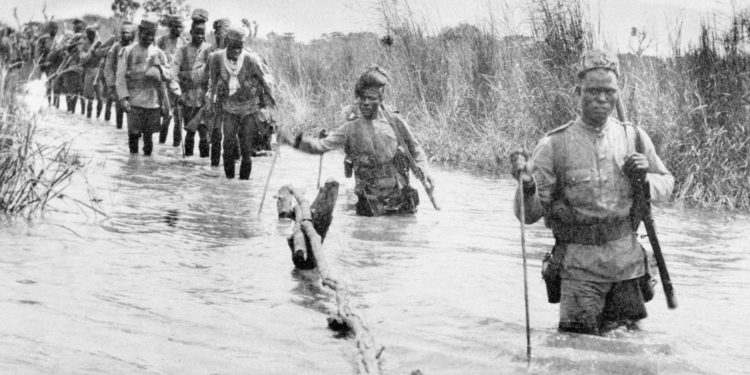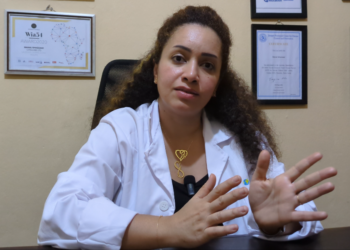The Commonwealth War Graves Commission (CWGC) has mounted a campaign to identify and honour Sierra Leoneans who participated in World War 1 (WW1).
The campaign was launched at a ceremony in Freetown last week.
The CWGC was set up to commemorate people who died fighting for the then British Empire during the war. But the contributions of Africans was largely unrecognised in its reports.
Of the nearly 5,000 Sierra Leoneans who served alongside British and Imperial forces in East Africa (Togoland, Cameroon and Mesopotamia), as fighting soldiers and in transport and labour roles, such as the Sierra Leone Carrier Corps, 900 of them did not return home.
At the ceremony at the Sierra Leone National Museum in Freetown on Wednesday 22nd June, CWGC representatives handed over “a book of remembrance” containing the names of more than 900 uncommemorated Sierra Leonean WW1 dead to the people of Sierra Leone through the Chairman of the National Council of Paramount Chiefs (NCPC), Sheku Amadu Tejan Fasuluku. The ceremony also marked the launch of campaign in search of such people.
Speaking at the event, Sierra Leone’s Minister of Defence, (Rtd) Brigadier General Kellie Hassan Conteh, decried the “unfair” treatment of Africans who participated in WW1 by the CWGC. He described it as a direct violation of the cardinal principles for which the Commission was established.
The CWGC was founded in 1917 to commemorate the perpetuity of those who lost their lives in the First World War and later the Second World War. According to Conteh, the move was meant to preserve the memory of all those commonwealth citizens, who paid the ultimate sacrifices in those struggles regardless of their race, rank in social or military life. But, he lamented, that cardinal principle of equality of treatment of those who struggled was unequally implemented, disfavouring most of the coloured people who took part.
Conteh cited a one-hour Channel 4 documentary, entitled “The Unremembered,” which aired in November 2019, exploring the CWGC’s treatment of Africans, which prompted the appointment of a special committee to probe the early history of the Commission and to identify inequalities in the way it commemorated the two wars.
The report of that special committee, according to Conteh, spoke eloquently about widespread inequalities based on imperial thinking at the time. He noted that the report said, among other things, that:
“In the 1920s, across Africa, the Middle East and India, imperial ideology influenced the operations of the imperial war graves commission in a way that it did not in Europe. The rules that were sacred there, were not always upheld elsewhere. As a result, a contemporary attitude towards non-European faith and different funerary rights in an individual and groups of perceived states of civilizations influence their commemorative treatment of them.”
Conteh however expressed excitement at efforts to right the moral wrongs done about a hundred years back.
“I am particularly pleased also that while they accepted the report makes for sobering reading, it recognises that there will be people and communities whom these findings relate as well as many more not directly connected who will be deeply saddened by the contents of the report,” he said.
A Professor of History at Fourah Bah College, University of Sierra Leone, Joe A D Alie, also spoke about a documentary which he said was titled, “The West Africans and the Great War”, which suggested that the role of West Africans in “the Great War” was sadly the neglected area of history despite the critical contributions they made to the British campaign.
Even though there are World War memorials in many of the capital cities of former British West African colonies, the services of those great men are largely forgotten in Africa and West African history, Alie said. The Sierra Leonean history professor described the presentation of the book of remembrance by CWGV to Sierra Leone as remarkable. According to him, paramount Chiefs, during the WW1, played pivotal role in the war by mobilising their citizens as well as well as material resources for the British war efforts.
Alie noted that among other people, the paramount chief of Nongowah Chiefdom donated one hundred bushel of rice and 14 bulls for the use of the British troops. He added that the name changed from “the great war” to world war one because another war broke up in 1939.
Prof. Alie went on to say that the Great War occurred when relationship between the British and the Creoles in the Freetown colony was having some challenges, but that the creoles in the colony made efforts and even volunteered to provide a regiment called “the king’s old creole boys who would fight and die for our gracious king and good old friend,” he recounted, reading from a document.
Alie further noted that the Sierra Leone natural quay, later named the Queen Elizabeth II Quay, was instrumental in British Maritime efforts in West Africa and beyond. He said due to the significant role it played in the WW2, Fourah Bay College, which was situated close to the habour, was relocated to Magbang, before been relocated to its current location on Mount Aureole.
According to Alie, the port was also instrumental for the British government in the 1980s war against Argentina over the folk land Island. He said Sierra Leoneans formed an integral part of the West African Regiment, adding that together with troops from the Sierra Leone contingent of the West African Frontier Force, they directly took part in the British Campaign against German-Togo land and in the Cameroon.
The Director of Operations, CWGC, Barry Murphy, said the book of remembrance provides a temporary place of tribute for the more than 900 men of the Sierra Leone Carrier Corps who lost their lives during WW1. He added that the book will hold their names until a suitable site is identified for their commemoration with a new memorial. He noted that the form of the commemoration will be guided by the government and people of Sierra Leone, whose views they are seeking via a nationwide radio campaign.
“Today, we take tangible steps in honouring those Sierra Leoneans who, for far too long, have been overlooked. They were causalities, not just because of the WW1, but of contemporary indifference to their services and suffering. That was wrong then and now, and we, at the CWGC, intend to right that wrong,” Murphy said.
The British High Commissioner to Sierra Leone, Lisa Chesney, spoke about the importance of recognition for Sierra Leone’s contribution to the two wars. She encouraged members of the public to come forward with their stories so that they might be shared in Sierra Leone and with the large Sierra Leonean community in the UK.
She also noted that “most of those who made up the rank of the Sierra Leone Carrier Corps supported the military campaign in East Africa. These porters or carriers literally bore the weight of the war on their shoulders. Without them, the campaign could not have been fought, let alone won,” she stated.
A facebook page has been created to engage Sierra Leoneans with information on people who participated in the war.






















